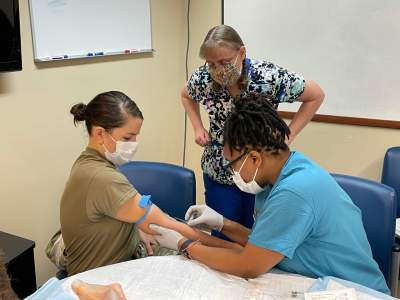curriculum
overview
We offer a broad array of educational experiences to help our residents prepare for practicing medicine after residency as well as achieving successful board certification in pediatrics. See below for detailed information on the different educational opportunities we offer.
academic half day
Our educational didactic curriculum is centered around an academic half-day which promotes dedicated, protected learning focused on pediatric board content specifications. Our program has an 18-month rotating curriculum, which allows for a consistent and organized learning pattern. In addition to traditional lectures provided by pediatric generalists and sub-specialists, our program has also incorporated longitudinal and interactive educational opportunities discussed below.
- Acute care symposium – During the first two months of each academic year the academic half-day is comprised of lectures that introduce the residents to the acute management of issues that they run into during residency and beyond.
- Resident quality improvement curriculum (RQIC) – Throughout first year, residents attend 10 sessions dedicated to introducing key concepts in Quality Improvement Science. During second and third year, residents have the opportunity to join or lead quality improvement initiatives throughout the hospital.
- Developmental/mental health case series – A longitudinal curriculum to provide residents with the resources and education needed to identify and manage common behavioral and mental health issues in the general pediatric setting.
- NICU bootcamp – Twice a year residents participate in interactive, hands-on conference on high yield neonatology topics and procedures. Residents rotate through multiple small group sessions led by neonatologists and subspecialists.
- Jeopardy board review – PGY-2 and PGY-3 residents participate in a monthly, 1-hour Jeopardy-style board review sessions with their class. A resident favorite, this series encourages comradery and education on high-yield board topics.
- Chief-lead longitudinal board review consisting of high-yield topics, often in the form of games.
- Diversity, equity and inclusion – longitudinal curriculum to promote diversity awareness, cultural competence, and health equity.
morning report
Our morning report is an informal and interactive 30-minute case-based presentation led by a senior resident or chief resident. It is held at Dayton Children’s Hospital every morning except the day of our academic half-day. Attended by inpatient senior residents, residents on electives, medical students, hospitalists, and subspecialists, it is an opportunity for growth of medical knowledge, differential diagnosis building, and critical decision making.
noon conference
Noon conference is a 1-hour lecture that is held during lunch twice a week (food provided!). Topics include AAP policy review, resident case conferences, resident morbidity and mortality conferences, mock codes, financial lectures, subspeciality lectures, etc.
Wright Patterson Medic
1-hour morning conference is held every day (except the day of academic half-day) for residents rotating on their ambulatory, newborn nursery, and adolescent blocks at WPMC. Lectures are given by various specialists on base such as child psychiatry, developmental pediatrics, orthopedics, adolescent medicine, ENT, dentistry, chief resident, etc. In addition, residents regularly practice their hands on skills at the WPMC Simulation Center and in monthly IV and suture labs.
continuity clinic lecture series
Residents in the continuity clinic participate in a 30-minute lecture on a general pediatric topic. The structured curriculum covers a different topic every week throughout the year.
continuity clinic curriculum example:
- July 5th Health Maintenance I: Growth & NBS
- July 12th Health Maintenance II: Screening Tests
- July 19th Immunizations
- July 26th Sports Pre-participation Physical
board review series
In May/June of every year, the third-year residents participate in eight half days of dedicated board review given by various generalists and subspecialists. This is protected time and residents are excused from clinic duties during this time.
additional opportunities
• Weekly grand rounds
• Monthly journal clubs (held both on and off campus)
• Monthly mock codes
• PALS, BLS and NRP courses
• Pediatric fundamental critical care support (PFCCS) - a two-day course that is funded by the program for every resident
• Yearly American Board of Pediatrics In-Training Exam to provide residents with a yearly measurement of their progress and information to help them tailor their educational experiences


